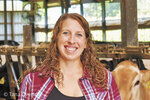
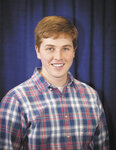
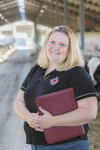

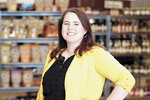
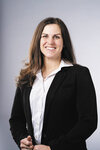
What is your involvement in the dairy industry?
Williams: I am an independent dairy nutritionist with Barton Kiefer Dairy Consulting. Along with that, we also own show cattle.
Peetz: I am a part-owner of Rosy-Lane Holsteins LLC in Watertown, Wisconsin.
Cederquist: I am the research program director for the Department of Animal & Dairy Sciences at the University of Wisconsin-Madison. I have oversite of the three dairy research facilities that the UW dairy faculty utilize for their studies.
Kepner: I am a financial officer at Compeer Financial ACA serving the northern part of Sauk County and all of Juneau, Adams and Marquette counties. I have clients in the dairy industry and help them with their lending needs.
Moore: My husband, Brandon, and I own and operate Moore Family Farms, a diversified dairy and livestock farm, where we background feeder cattle, milk 40 registered Holsteins, and also raise laying hens, broilers, hogs and goats. We also process our own milk at Moore Family Farms Creamery and market through our two farm-to-table shops, Moore Local. We are also partners in Rockdale Locker, a state-inspected meat locker.
Ruzic: I am an account manager for Wisconsin and part of Minnesota for Zinpro, as well as a dairy and crop farmer. We are transitioning out of the dairy business but will continue to cash crop 400 acres.
What is your background?
Williams: I live in Shawano with my husband and three children. I grew up in the southwest corner of the state on a small cow-calf operation along with cash crops. My grandparents were registered Holstein breeders and lived right up the road. It was through them that I fell in love with the Holstein cow. I started showing with them as soon as I was old enough to in 4-H and bought my first heifer when I was 11. I have owned cattle since that point. I worked on numerous dairy farms through high school and college. I graduated from the University of Wisconsin-Platteville with an animal science degree with a double emphasis in agricultural business and dairy science. Once out of college, I worked at two separate feed mills doing feed sales and nutrition work before buying my grandparents’ herd when my oldest was born. I farmed full time with two littles in tow until the pandemic hit. We were in the process of buying the entire farm at that time. The uncertainty that came with that period led to the decision to sell the majority of the herd and hobby farm while both working off the farm. It was then that we relocated to northeast Wisconsin. I now get the opportunity to help many dairy producers through my nutrition business while raising cattle for my kids to show.
Peetz: I grew up around my family’s dairy farm that became a cash-crop farm when I was in elementary school. Outside of an office job at an engineering firm, the summer after I graduated from high school, every internship or part-time job I’ve held has been in the dairy industry either on-farm or in a sales/consulting role. In 2020, I graduated from the University of Wisconsin-Platteville with a degree in dairy science and agribusiness.
Cederquist: I hold a master’s degree in animal science from the University of Arizona. Over the course of the last 16 years, I have held several on-farm management type roles and worked for a short time as a dairy nutrition consultant. I have been with the University of Wisconsin for over nine years. I was involved in 4-H as a child but did not really get involved in the dairy industry until I started at the University of Arizona in 2001. My first summer in college, I took an internship on a large commercial dairy farm in Stanfield, Arizona, and I was hooked. I never looked back and have been working in the industry in some capacity since then.
Kepner: I grew up on a hog and cash grain farm in northern Illinois and received a bachelor’s degree in business with a major in finance from Northern Illinois University. I’ve worked for Farm Credit for 11 years in the same lending role. I love working with farmers in the counties I serve because there is a wide variety and every day is different.
Moore: Brandon and I met at the University of Wisconsin-Platteville, and I moved from Wisconsin to Iowa after graduation, where we started a first-generation stock cow farm. We began dairying in 2014, opened our first shop in 2017, our second shop in 2021, and the locker and creamery in 2022.
Ruzic: I grew up on a small, registered dairy farm in eastern Wisconsin. I got a bachelor’s degree from the University of Wisconsin-Madison in dairy science. I moved to central Wisconsin upon graduation where I was a dairy nutritionist for over 13 years. I joined Zinpro over three years ago and have been supporting nutritionists and farmers ever since.
What led you to participate in the PDP Cornerstone Dairy Academy?
Williams: I had heard many great things about the PDP Cornerstone Dairy Academy from a client of mine that had participated. In the years since selling the cows, I had been focusing on personal development. Cornerstone Dairy Academy was just the thing to continue with some professional development. The more I can improve myself, the more value I can bring to my clients and their operations.
Peetz: I heard about it through word of mouth and had a desire to polish off some soft skills when leading teams. I knew the academy could help me with this.
Cederquist: In my role at UW, leadership in a lot of different capacities is necessary. I work not only with my staff on the farm but also with a large variety of students, researchers, scientists, faculty and industry professionals. My boss had recommended this program to me as a way to grow in my management techniques and thought it might be helpful in learning to manage the large variety of people I encounter.
Kepner: As a relatively new employee in 2015, I was encouraged to apply for the Cornerstone Dairy Academy by my boss at the time. I completed two of the three pillars by 2017 and then took a small break to finish the third pillar in 2024. I enjoy listening to the different speakers that Cornerstone has teaching the program.
Moore: In 2021, I decided that I needed to broaden my professional development horizons with the expansion of our businesses. I have continually been impressed with PDP’s programming, so I thought that the Cornerstone Dairy Academy would be the place to start.
Ruzic: Zinpro has had a strong partnership with PDP for many years, and I thought it would be a great way for me to improve my leadership skills and learn about other areas of the industry that I’m not as familiar with.
What did you learn from that involvement, and how will you use that going forward?
Williams: Participating in all three pillars gave me a well-rounded experience. I gained more knowledge on leadership, not only leading a team but also myself and family. Each pillar broke down different aspects of leadership and gave applicable strategies to take back to your teams and customers. Real-world examples made it a seamless transition to use these skills in day-to-day interactions. Another thing I found beneficial was the training on working with different generations. As an agricultural professional calling on many multi-generational farms, knowing how to best communicate with each generation has had a positive impact on how I communicate with my clients and prospects.
Peetz: Each pillar reiterated the importance of emotional intelligence and professionalism in the workplace. I use concepts related to that every day as I work with groups of people doing their best to care for cows, calves and land.
Cederquist: Every pillar brought new ideas and thoughts. It truly made you think and reflect on how you handle yourself in the workplace. To be a good manager and good leader, you truly do need to be able to read the room around you and play to the strengths of the people you are working with. The academy focused on teaching you how to do this in a variety of ways. Whether there be generational differences, gender differences or commitment differences in your workplace, everyone has the ability to be successful if they have the right leadership to get them there. I find myself often thinking about something I learned during the academy when I am encountering a new person, or new obstacle, and question myself on whether or not I am taking the right approach. Sometimes, the answer is, “Absolutely, yes I am.” But, sometimes I have to reflect on what is happening around me and give it a second thought. Being able to do this has helped me improve my skills and allows me to communicate effectively with a lot of people around me.
Kepner: Personally, my favorite pillar was the servant leadership pillar with Tom Thibodeau. I always enjoy hearing him speak and sharing his personal stories growing up on the farm and other extracurricular activities. The influential leadership pillar was very interesting, learning about etiquette, communication, conflict resolution and teamwork. During the visionary leadership track in 2024, the information Dr. Kohl spoke about is invaluable when thinking about the economy, interest rates and how the export market impacts so much. Dr. Kyte also provided great information about living an ethical life and finding your third place.
Moore: The Cornerstone Dairy Academy is an incredibly useful tool as we continue to grow our business. The lessons learned continue to be integral as we work with our most important resources: our people. All three tracks were phenomenal, but the visionary leader track really helped us to set goals for the future of our business. The servant leader track’s influence was simply indescribable. I actually went home and had a workshop with my kids on how we can show love to each other through our actions.
Ruzic: I learned so much during each of the three pillars, but the recurring theme throughout all of them was making connections with people and being grateful. All of our facilitators did a great job making us think about how we show up at work, at home and in the community, and how we can adjust our leadership style based on the group we’re working with. From learning about how to be a servant leader to proper etiquette, global market influence and working as a team, each pillar had something to take home and implement no matter what our place is in the industry. I will use what I learned in my career, at my farm and in my family long into the future.
What would you tell prospective students to encourage their participation?
Williams: If you are considering applying, I would tell you to definitely go for it. You will never regret investing in yourself. As an added bonus, the networking opportunities are endless. There is something to be said about being in a room full of like-minded people who are trying to better themselves.
Peetz: PDP Cornerstone Dairy Academy brings real people together to talk about what soft skills they struggle with on farms and the businesses that support farms. The people in the room also wish to get better, so it is a good atmosphere of dairy-minded folks looking to improve how they treat others every day.
Cederquist: Do not ever think that you have nothing to learn. Do not ever think there is no improvement that you can make in yourself or in your leadership style. The world around us is always changing and evolving. We have all learned over the past four years how quickly our lives can change, and we have been forced to take a pause and rethink what is important around us. Being a good leader is taking the time to remember what being a good leader means. This Cornerstone Dairy Academy will help to reset, refocus and refresh your leadership style and skills. It is absolutely worth the time and effort on your part. Invest in yourself. You won’t regret it.
Kepner: All in all, every pillar is great, and I would encourage anyone in the agricultural industry to apply for the academy. The PDP conference following the Cornerstone Dairy Academy offers top-notch breakout sessions and relevant dairy industry knowledge.
Moore: If you’re on the fence about the Cornerstone Dairy Academy, don’t be. Try your first track, and I can guarantee you’ll be back to finish the program out. PDP’s programming is visionary but also boots-on-the-ground real. Every time I leave a PDP program, I have a set of real and actionable steps to improve our farm business, our off-farm business and, of course, our life as a whole.
Ruzic: You won’t regret taking the time to invest in this program. The connections you make and the skills you learn will help you no matter where your career goes in the industry or on the farm. The facilitators make the sessions fun and interactive, and the staff at PDP are helpful with logistics. I would recommend it to anyone in the dairy industry, whether you’re young in your career or more tenured. Either way, you’ll come away with skills to implement in your everyday life.
Comments
No comments on this item Please log in to comment by clicking here